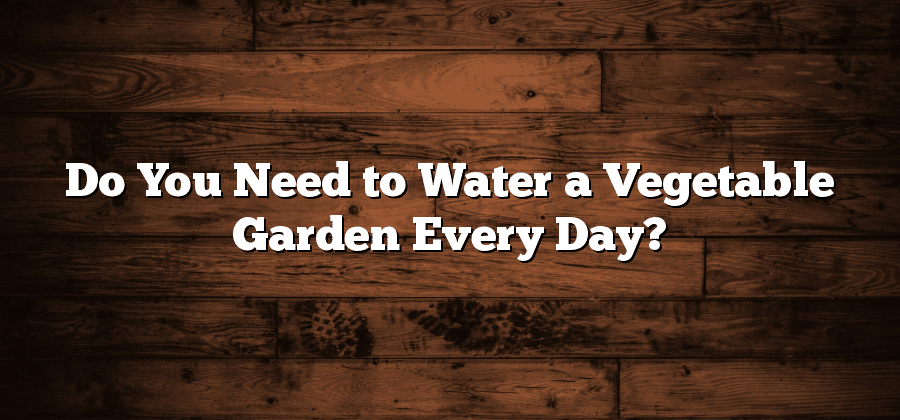Factors to Consider for Vegetable Garden Watering
Proper watering is vital for the success of your vegetable garden. It not only affects the overall health and growth of your plants but also plays a crucial role in their productivity. When it comes to vegetable garden watering, there are several factors that need to be considered.
Firstly, the type of soil in your garden plays a significant role in determining how often and how much you need to water your vegetables. Sandy soil tends to drain quickly, requiring more frequent watering sessions, whereas clay soil retains water for longer periods, requiring less frequent watering. Understanding your soil type and its water-holding capacity is crucial for ensuring optimal watering.
Secondly, the stage of your vegetable plants and their water requirements should be taken into account as well. Young seedlings require more frequent watering to establish their roots, while mature plants may require deeper and less frequent watering. Pay attention to the specific water needs of each vegetable variety you are growing to ensure they are adequately nourished and hydrated.
By considering these factors, you can develop a well-informed watering routine that meets the individual needs of your vegetable garden. Next, we will delve into understanding the water requirements of vegetables to help you make better decisions when it comes to watering your plants effectively.
Understanding the Water Requirements of Vegetables
It is essential for gardeners to understand the water requirements of the vegetables they are growing. Different vegetables have different water needs, and meeting those needs is crucial for their growth and productivity. One important factor to consider is the type of vegetable being grown. Leafy greens, for example, require more water compared to root vegetables. This is because leafy greens have a higher water content and need to maintain their moisture levels to stay fresh and crisp.
Moreover, the stage of growth also affects a vegetable’s water requirements. Young plants need more water to establish strong root systems, while mature plants may require less frequent but deeper watering to encourage deeper root growth. Additionally, external factors such as temperature and weather conditions play a role. During hot and dry periods, vegetables often require more frequent watering to prevent wilting and dehydration. On the other hand, excessive rainfall may saturate the soil and impede root development. By understanding the specific water needs of different vegetables and considering these influencing factors, gardeners can effectively manage their watering practices and promote healthy plant growth.
Assessing Soil Moisture Levels in the Garden
To ensure the successful growth of your vegetable garden, it is crucial to regularly assess the moisture levels in the soil. This allows you to determine if your plants are receiving enough water or if adjustments need to be made to avoid under or overwatering. There are several methods you can use to assess soil moisture levels in your garden.
One common method is the finger test, where you simply stick your finger about an inch into the soil. If the soil feels dry, it is a sign that watering is needed. However, if the soil feels wet or overly saturated, it indicates that the plants are receiving too much water. Another option is to use a soil moisture meter, which provides accurate readings of the moisture content in the soil. This tool can be inserted into the ground and provides instant readings, guiding you in making informed watering decisions for your vegetable garden.
The Role of Climate in Vegetable Garden Watering
Vegetable gardening requires careful consideration of various factors, and one of the most crucial aspects to consider is the climate. The climate of a specific region plays a significant role in determining the water requirements of vegetables and ultimately affects the success of the garden. Different climatic conditions, such as temperature, humidity, and precipitation levels, can have direct impacts on the amount of water needed by plants.
In regions with hot and dry climates, water evaporates more quickly from the soil, leading to increased water loss. As a result, vegetable plants in these areas often require more frequent watering to meet their moisture needs. On the other hand, in regions with cooler and more humid climates, the water loss due to evaporation is relatively lower, and hence, plants may not require watering as frequently. Understanding the climate of your gardening location is essential in determining how often and how much water your vegetable garden needs.
Choosing the Right Irrigation Method for Your Vegetable Garden
One of the most important aspects of successful vegetable gardening is choosing the right irrigation method. Proper watering is essential for the health and productivity of your plants, as well as for conserving water and promoting sustainability. There are several factors to consider when selecting the irrigation method that best suits your vegetable garden.
First, assess your garden’s specific needs. Different plants have different water requirements, so it’s important to understand the moisture needs of the vegetables you are growing. Some vegetables, like tomatoes and peppers, prefer consistent, even moisture, while others, like carrots and radishes, prefer slightly drier conditions. Consider the water needs of your vegetables and choose an irrigation method that can meet those needs effectively.
Next, consider the size and layout of your garden. If you have a small, compact garden, a handheld hose or watering can may be sufficient for watering. However, for larger gardens or gardens with multiple beds, a more efficient method, such as drip irrigation or soaker hoses, may be necessary. These methods deliver water directly to the base of plants, minimizing water waste and ensuring even distribution.






